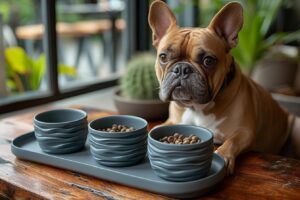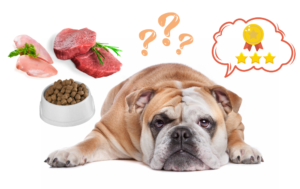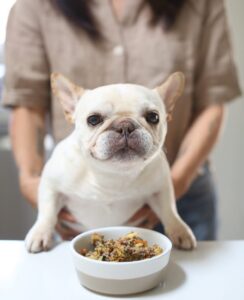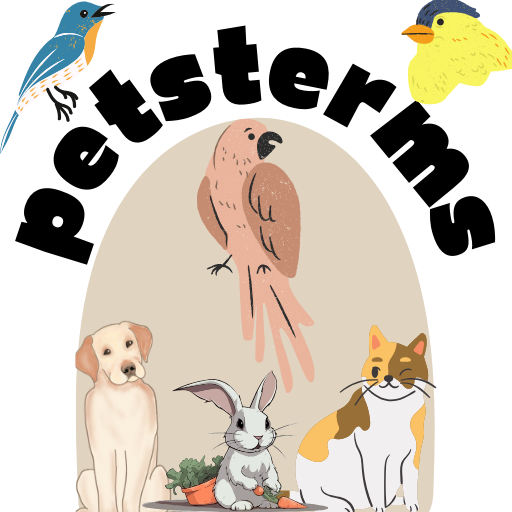
Bulldogs deserve the best dog food tailored to their unique needs.
Their stocky build, sensitive digestion, and skin troubles demand special care.
A proper diet keeps them energetic, healthy, and thriving.
Finding the right food isn’t just important—it’s transformation.
Let’s explore what fuels these lovable companions best!
Why Bulldogs Need Specific Dog Food
Bulldogs are more than just adorable—they’re a breed with unique dietary needs.
Their special build and common health concerns make it crucial to choose the right food.
Here’s why bulldogs thrive on food tailored to their needs:
Sensitive Stomachs
Bulldogs often struggle with digestive issues.
Foods with fillers like corn or soy can upset their bellies.
Opting for easily digestible ingredients helps avoid bloating and discomfort.
Prone to Allergies
This breed is prone to food allergies, which can cause itchy skin and ear infections.
Dog food with limited or hypoallergenic ingredients minimizes allergic reactions.
Look for options free of common allergens like wheat or artificial additives.
Skin and Coat Health
Bulldogs frequently face skin issues, including dryness or irritation.
Foods rich in omega-3 and omega-6 fatty acids promote a shiny coat and soothe their skin.
Proper nutrition is a game-changer for managing these problems.
Weight Management
With their low activity levels, bulldogs are prone to obesity.
The right dog food ensures balanced calories to maintain a healthy weight.
Support for Joint Health
Bulldogs’ sturdy frames can strain their joints over time.
Foods with glucosamine and chondroitin support joint health and mobility.
Key Nutritional Needs of Bulldogs

Feeding your bulldog the right food is more than just filling their bowl.
It’s about providing the nutrients that keep them strong, happy, and thriving.
Bulldogs have unique dietary needs that require special attention.
High-Quality Protein for Muscle Strength
Bulldogs have a muscular build that needs proper protein to maintain.
Lean meats like chicken, turkey, or fish are excellent protein sources.
Avoid low-quality proteins that won’t give them the energy they need.
Healthy Fats for Energy and Skin Health
Fats aren’t just for fuel; they also help maintain a shiny coat.
Omega-3 and omega-6 fatty acids are crucial for healthy skin and reducing inflammation.
Look for dog foods with fish oil or flaxseed to meet this need.
Digestible Carbohydrates for Sensitive Stomachs
Bulldogs can struggle with digestion, so carbohydrates must be easy to process.
Sweet potatoes, brown rice, and oats are gentle on their stomachs.
Steer clear of foods with unnecessary fillers like corn or soy.
Essential Vitamins and Minerals
Vitamins like A, E, and D support their immune system and overall well-being.
Calcium and phosphorus are vital for strong bones and joint health.
Probiotics and Fiber for Gut Health
A healthy gut is key to avoiding bloating and gas.
Probiotics and fiber help bulldogs digest their food and stay regular.
Top Features to Look for in Bulldog Dog Food
Choosing the best food for your bulldog goes beyond the label.
It’s about understanding the features that keep your pup healthy and thriving.
Let’s dive into the must-have qualities every bulldog dog food should offer.
Hypoallergenic or Limited-Ingredient Formulas
Bulldogs are prone to food allergies that can lead to itchy skin or upset stomachs.
Limited-ingredient diets with simple recipes help avoid triggers.
Look for options that exclude common allergens like wheat, soy, or artificial additives.
Digestible Ingredients
Bulldogs often deal with sensitive stomachs, so their food must be gentle.
Ingredients like sweet potatoes, rice, or pumpkin aid digestion.
Avoid fillers like corn or by-products that can be hard to process.
Healthy Fats for Skin and Coat
To combat common bulldog skin issues, foods rich in omega-3 and omega-6 fatty acids are essential.
Good sources include flaxseed, chicken fat, and fish oil.
Protein-Packed Nutrition
Protein fuels their muscular build and keeps energy levels up.
Choose foods with high-quality sources like chicken, lamb, or salmon.
Added Probiotics and Prebiotics
Probiotics and prebiotics support gut health and reduce digestive issues.
They also enhance nutrient absorption, ensuring your pup gets the most out of their meals.
Best Dog Food for Bulldogs: Top Recommendations

Finding the best dog food for bulldogs can feel overwhelming with so many options out there.
Don’t worry! We’ve rounded up top choices that cater to their unique needs, keeping them healthy and happy.
Dry Dog Food Options
- Brand A:
- Packed with high-quality protein like chicken or salmon.
- Includes probiotics for easy digestion.
- Grain-free, making it ideal for sensitive stomachs.
- Brand B:
- Specially designed for dogs with allergies.
- Contains omega fatty acids for shiny coats.
- Limited ingredients to avoid unnecessary fillers.
Wet Dog Food Options
- Brand C:
- Its mouthwatering flavor makes it ideal for finicky eaters.
- High moisture content supports hydration.
- Includes essential vitamins and minerals for balanced nutrition.
- Brand D:
- Ideal for dogs with dental issues or who prefer softer textures.
- Made with natural, human-grade ingredients.
- No artificial flavors or preservatives.
Special Diets for Bulldogs
- Weight Management:
- Low-calorie formulas help maintain a healthy weight.
- Includes fiber for better digestion and fullness.
- Allergy-Friendly Options:
- Hypoallergenic recipes for sensitive pups.
- Rich in omega-3s to soothe irritated skin.
Homemade Diets for Bulldogs (Optional)

Sometimes, the best dog food for bulldogs is the one you make at home.
Preparing meals yourself ensures you know exactly what goes into your bulldog’s bowl.
Here’s why and how to create a homemade diet that supports their health.
Benefits of Homemade Diets
- Full control over ingredients to avoid allergens or fillers.
- Fresh, high-quality food tailored to your bulldog’s unique needs.
- No artificial preservatives, flavors, or colors.
Key Ingredients for a Balanced Diet
- Protein: Lean meats like chicken, turkey, or fish for muscle maintenance.
- Carbohydrates: Brown rice, quinoa, or sweet potatoes for energy.
- Healthy Fats: Fish oil or flaxseed to support skin and coat health.
- Vegetables: Carrots, green beans, or spinach for added vitamins and fiber.
- Supplements: Add calcium and a multivitamin to ensure balanced nutrition.
Simple Recipe Idea
- Cooked chicken (boiled or grilled, no seasoning).
- Steamed sweet potatoes and green beans.
- A teaspoon of fish oil mixed in.
- Serve in appropriate portions based on your bulldog’s weight and activity level.
Things to Keep in Mind
- A veterinarian should always be consulted before implementing a homemade diet.
- Stay away from bad foods like chocolate, garlic, and onions.
- Maintain variety to meet all nutritional requirements.
Feeding Tips for Bulldogs

Feeding bulldogs the right way is just as important as choosing the best dog food for them.
Proper feeding habits ensure they stay healthy, happy, and full of energy.
Here are some practical tips to make mealtime work for your bulldog’s unique needs.
Stick to Portion Control
Bulldogs are prone to obesity, so portion size matters.
Follow the feeding guidelines on the food label based on their weight and activity level.
Overfeeding can cause health problems and weight gain.
Divide Meals into Smaller Portions
Instead of one big meal, feed your bulldog two to three smaller meals a day.
This helps with digestion and prevents bloating, a common issue for this breed.
Choose a Slow-Feeding Bowl
Bulldogs tend to gulp down food, which can lead to choking or gas.
A slow-feeder bowl encourages them to eat more gradually, improving digestion.
Always Provide Fresh Water
Hydration is essential for bulldogs, especially if they eat dry kibble.
Keep clean water accessible throughout the day.
Monitor for Food Allergies
Keep an eye out for symptoms such as diarrhea, vomiting, or itching after meals.
Switch to a hypoallergenic food if needed, and consult your vet.
Common Mistakes to Avoid
When it comes to feeding your bulldog, small mistakes can lead to big health issues.
Avoiding these common mistakes ensures your bulldog stays healthy and happy.
Here’s what to watch out for when choosing and feeding the best dog food for bulldogs.
Overfeeding Your Bulldog
Bulldogs are prone to obesity, and overfeeding is a key contributor.
Always follow the recommended portion sizes based on their weight and activity level.
Overfeeding can cause joint problems, heart issues, and even shorten your dog’s lifespan.
Choosing Low-Quality Ingredients
Not all dog foods are created equal.
Avoid foods that list fillers like corn, soy, or by-products as the main ingredients.
These can lead to poor digestion, allergies, and weight gain.
Ignoring Food Allergies or Sensitivities
If your bulldog shows signs of allergies like itching or digestive issues, it could be the food.
Pay attention to any reactions and switch to hypoallergenic or limited-ingredient foods if necessary.
See your veterinarian for the best course of action.
Feeding the Same Food Every Day
Variety is important for balanced nutrition.
While consistency is key, feeding your bulldog the same food every day can lead to nutrient gaps.
Mix up the protein sources, vegetables, and carbohydrates to keep meals exciting and healthy.
Not Providing Enough Water
Dry kibble can be hard on your bulldog’s hydration.
Always have fresh water available to keep them hydrated, especially if you feed dry food.
Conclusion
Choosing the best dog food for bulldogs ensures your furry friend stays healthy, happy, and full of life.
It’s all about understanding their unique needs and providing the right nutrition.
Don’t be afraid to explore different options and consult your vet for guidance.
Remember, a balanced diet will support their digestion, coat, and energy levels.
By giving your bulldog the right food, you’re setting them up for a long, thriving life by your side!

